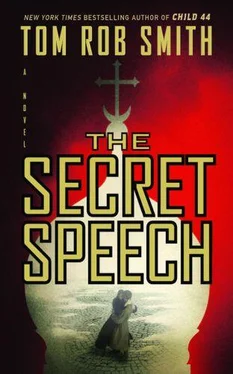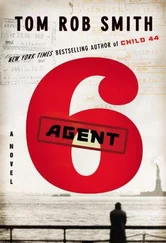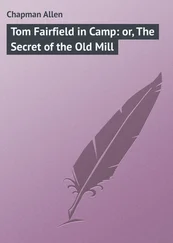Tom Smith - The Secret Speech
Здесь есть возможность читать онлайн «Tom Smith - The Secret Speech» весь текст электронной книги совершенно бесплатно (целиком полную версию без сокращений). В некоторых случаях можно слушать аудио, скачать через торрент в формате fb2 и присутствует краткое содержание. Жанр: Триллер, на английском языке. Описание произведения, (предисловие) а так же отзывы посетителей доступны на портале библиотеки ЛибКат.
- Название:The Secret Speech
- Автор:
- Жанр:
- Год:неизвестен
- ISBN:нет данных
- Рейтинг книги:5 / 5. Голосов: 1
-
Избранное:Добавить в избранное
- Отзывы:
-
Ваша оценка:
- 100
- 1
- 2
- 3
- 4
- 5
The Secret Speech: краткое содержание, описание и аннотация
Предлагаем к чтению аннотацию, описание, краткое содержание или предисловие (зависит от того, что написал сам автор книги «The Secret Speech»). Если вы не нашли необходимую информацию о книге — напишите в комментариях, мы постараемся отыскать её.
The Secret Speech — читать онлайн бесплатно полную книгу (весь текст) целиком
Ниже представлен текст книги, разбитый по страницам. Система сохранения места последней прочитанной страницы, позволяет с удобством читать онлайн бесплатно книгу «The Secret Speech», без необходимости каждый раз заново искать на чём Вы остановились. Поставьте закладку, и сможете в любой момент перейти на страницу, на которой закончили чтение.
Интервал:
Закладка:
Excitement had been manufactured by a saturation media campaign. The design schematics had been reprinted in Pravda , footage had run in the cinemas showing real people superimposed against a matte drawing of the completed baths. While the propaganda geared up, work had shuddered to a halt. The ground beside the river was unstable and susceptible to slippage. The foundations had begun to move and tear, causing the authorities to regret not examining the ancient foundations of the church more carefully before scooping them up and tossing them aside. Some of the best minds in the country had been called in and, after careful consideration, declared it unsuitable for a complex that required deep networks of pipes and drains, dug farther down than the church had ever extended. Those experts had been dismissed and more pliable experts brought in who, after a different kind of careful consideration, declared the problem fixable. They merely needed more time. That was the answer the State had wanted to hear, not wishing to admit to a mistake. These experts had been housed in luxury apartments where they drew diagrams, smoked cigars, and jotted down calculations while the deep pit filled with rain during the autumn, snow during the winter, and mosquitoes during the summer. The propaganda footage was pulled from the cinemas. Shrewd citizens understood that it would be best to forget about the project. Imprudent citizens wryly commented that a watery trench made a poor substitute for a three-hundred-year-old church. In the summer of 1951 Leo had arrested a man for making such a quip.
Leo checked his watch. He’d been waiting for over an hour. Shivering and exhausted, he was near mad with impatience. He had no idea if his wife had survived surgery and, cut off from communication, had no means of finding out. There was no question that the decision to leave Raisa’s side and meet Lazar was the correct one. There was nothing he could do in the hospital. No matter how much Zoya hated him, no matter how she behaved, no matter if she wanted him dead, he’d taken responsibility for her, a responsibility he’d promised to uphold whether she loved him or not. In preparation for the meeting he’d gone home, showered, scrubbed the smell of the sewer off him, and changed out of his uniform. His hands had been dressed at the hospital. He’d refused painkillers, fearing that they might dull him. Wearing civilian clothing, he was conscious that the trappings of authority might provoke a vengeful priest.
Hearing a noise, Leo turned, searching the gloom for his adversary. There was residual light from nearby buildings outside the fenced perimeter. Precious machinery — cranes, diggers — stood abandoned, left to rust because no one dared admit defeat and redeploy them where they could be put to use. Leo heard the noise again: the clang of metal against stone. It wasn’t coming from inside the construction site: it was coming from the river.
Cautiously, he approached the stone ledge, tentatively leaning over and peering down toward the water. A hand reached up not far from where he was standing. A man nimbly pulled himself up, squatting on the ledge before jumping down to the construction site. To his side another man climbed up. They were crawling out of the mouth of a sewer tunnel, clambering up the wall, like a disturbed ant colony responding to a threat. Leo recognized the young boy who’d murdered the patriarch clambering out, expertly using finger- and toeholds in the brickwork. Watching the boy move with such agility, it was unsurprising that he’d survived his earlier dive into the torrent.
The gang searched Leo for weapons. There were seven men and the boy, tattoos on all of their necks and hands. Several items of their clothes were well tailored, while others were threadbare, mismatched as if a haphazard selection from the wardrobes of a hundred different people. Their appearance left no question. They were part of a criminal fraternity — the vory —a brotherhood forged during their time in the Gulags. Despite Leo’s profession, he encountered vory rarely. They considered themselves apart from the State.
The gang members spread out: examining the surroundings, making sure it was safe. Finally the boy whistled, giving the all-clear. Two hands appeared on the ledge. Lazar climbed up, towering above his vory , silhouetted by the lights on the other side of the river. Except that this wasn’t Lazar. It was a woman — Anisya, Lazar’s wife.
Anisya’s hair was cropped short. Her features were sharp. All the softness in her face and body had been lost. Despite this, she seemed more intensely alive, more striking and vivid than ever before, as if some great energy emanated from her. She was wearing loose trousers, an open shirt, and a short, thick coat — dressed much like her men. There was a gun on her belt, like a bandit. From her triumphant position she looked down at Leo, proud that her arrival had surprised him. Leo could manage only one word, her name:
— Anisya?
She smiled. Her voice was cracked and deep, no longer melodic, no longer the voice of a woman who used to sing in her husband’s choir:
— That name means nothing to me now. My men call me Fraera.
She jumped down from the ledge not far from where Leo was. Standing up straight, she studied his face intently:
— Maxim…
She addressed him with the alias he’d taken:
— Answer me this, and don’t lie, how often did you think of me? Every day?
— Honestly, no.
— Did you think of me once a week?
— No.
— Once a month…
— I don’t know…
Fraera allowed him to taper off into embarrassed silence before remarking:
— I can guarantee you that your victims think about you every day, every morning, and every night. They remember your smell and the sound of your voice — they remember you as clearly as I see you now.
Fraera raised her right hand:
— This was the hand you touched when you made me your offer, that I leave my husband. Isn’t that what you said? I should let him die in the Gulags while I slipped into bed with you?
— I was young.
— Yes, you were. Very young and yet you were still given power over me, over my husband. You were a boy with a crush, little more than a teenager. You thought you’d done a decent thing in trying to save me.
This was a conversation she’d practiced a thousand times, words shaped by seven years of hate:
— I had a lucky escape. If fear had taken hold of me, if I had faltered, I would’ve ended up as your wife, the wife of an MGB officer, an accomplice to your crimes, someone to share your guilt with.
— You have every reason to hate me.
— I have more reason than you think.
— Raisa, Zoya, Elena: they have nothing to do with my mistakes.
— You mean that they are innocent? When has that mattered to officers like you? How many innocent people have you arrested?
— You intend to murder every person who wronged you?
— I didn’t murder Suren. I didn’t murder your mentor Nikolai.
— His daughters are dead.
Fraera shook her head:
— Maxim, I have no heart. I have no tears to shed. Nikolai was weak and vain. I should’ve guessed he would die in the most pathetic of fashions. However, as a message to the State, it was certainly more powerful than him merely hanging himself.
Just as the Church of Sancta Sophia had been destroyed and replaced with a dark, deep pit, Leo wondered if the same was true of her. Her moral foundations had been ripped up and replaced with a dark abyss.
Fraera asked:
Читать дальшеИнтервал:
Закладка:
Похожие книги на «The Secret Speech»
Представляем Вашему вниманию похожие книги на «The Secret Speech» списком для выбора. Мы отобрали схожую по названию и смыслу литературу в надежде предоставить читателям больше вариантов отыскать новые, интересные, ещё непрочитанные произведения.
Обсуждение, отзывы о книге «The Secret Speech» и просто собственные мнения читателей. Оставьте ваши комментарии, напишите, что Вы думаете о произведении, его смысле или главных героях. Укажите что конкретно понравилось, а что нет, и почему Вы так считаете.












